[ad_1]
There have been a lot of James Bond movies over the years. The most famous secret agent on the planet has been a pop culture powerhouse for decades, through 25 movies to date. Some have been genuine masterpieces, others less so.
If you’ve watched all or many of the movies, you surely have a favorite. If you’re new to 007 but Bond-curious, you may be looking to hit the stylish, stunt-spectacular highlights and avoid the groaning misfires. We’re here to help you with that or to confirm/challenge your personal list of the best. The rankings below put all the Bond movies in order from worst to best, based on reviews by film critics over the years.
Daniel Craig brought us a new Bond for a new century, even as his first film in the franchise, Casino Royale, harked back to the Ian Fleming novel that introduced 007, way back in the 1950s. The Bond movies got started with Sean Connery, who first donned the dinner jacket and battled Spectre in Dr. No, which debuted in the UK in October 1962 but not in the US until May 1963 (making for an extended 60th anniversary). In the intervening years, we’ve seen spins on Bond from George Lazenby, Roger Moore, Timothy Dalton and Pierce Brosnan. Your enthusiasm for each may vary.
Right now we’re in limbo, waiting to find out who Eon Productions will call into action as the next new James Bond and how the man from MI6 might be reinvented yet again.
The rankings below are based on an aggregate of movie reviews, specific to when the films came out, as compiled by Metacritic. If you’re looking for more background on Bond, and recommendations on where to start, check out our intro to James Bond.
You can now catch the Bond movies on Amazon’s Prime Video subscription service, though you’ll probably have to pay for a rental for anything that’s not No Time to Die. Some of the Craig movies have been available through Netflix as well, and a wider selection of Bond movies have recently been showing up on the MGM Plus service (newly rebranded from Epix). HBO Max just reported for 007 duty, too, with about half the Bond movies available, including Dr. No, The Man With the Golden Gun (Roger Moore), The Living Daylights (Timothy Dalton), GoldenEye (Pierce Brosnan) and Craig’s Casino Royale.
See also: Being James Bond: How 007 Movies Got Me Into Intelligence Work
James Bond movies ranked, from worst to best
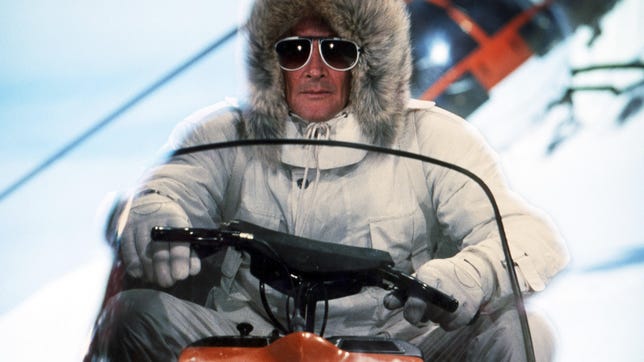
Keith Hamshere/Getty Images
According to the critical consensus, Roger Moore isn’t just the star of the worst James Bond movie — this snowboarding 1985 entry — he’s the star of the worst James Bond movies, period. When combined and averaged, his 007 films produce a franchise-low Metascore of 53.7.
A View to a Kill was Moore’s seventh and final 007 movie. His co-stars included Christopher Walken as gleefully murderous villain Max Zorin and Grace Jones as Bond baddie (and eventual ally) May Day. The plot that Bond has to foil: Zorin’s scheme to destroy Silicon Valley so he can control the market for computer chips.
“The James Bond series has had its bummers, but nothing before in the class of this one,” Pauline Kael wrote for The New Yorker.
Metascore: 40
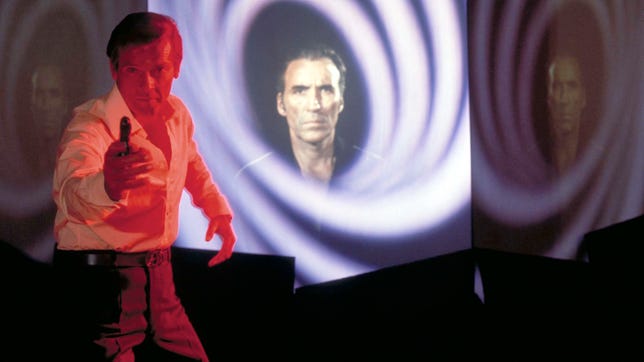
MGM
26. The Man With the Golden Gun
As far as critics are concerned, this 1974 installment, Moore’s second outing as 007, is another bottom-dweller in the James Bond franchise. “If you enjoyed the early Bond films as much as I did, you’d better skip this one,” Nora Sayre wrote in The New York Times.
The Man With the Golden Gun, featuring Christopher Lee as the Bond villain and rival marksman Scaramanga and eventual Fantasy Island star Herve Villechaize as his henchman Nick Nack, grossed $97.6 million worldwide, the weakest box-office performance by any of the Roger Moore 007 films.
Metascore: 43

LMPC / Getty Images
This offbeat, comic entry features a multitude of actors as James Bond. But more 007s do not make things merrier — or better. Variety called this version of Casino Royale “a film of astounding sloppiness” and “an insult to the Bond name.”
This is one of the two noncanonical, non-Eon films in our rundown. (And for Bond completists — sorry, we’re not including the 1954 television production of Casino Royale, which portrayed our hero as Jimmy Bond, and an American to boot.)
1967’s Casino Royale, featuring David Niven, Peter Sellers and Orson Welles, grossed a Bond-worst $41.7 million worldwide.
Metascore: 48
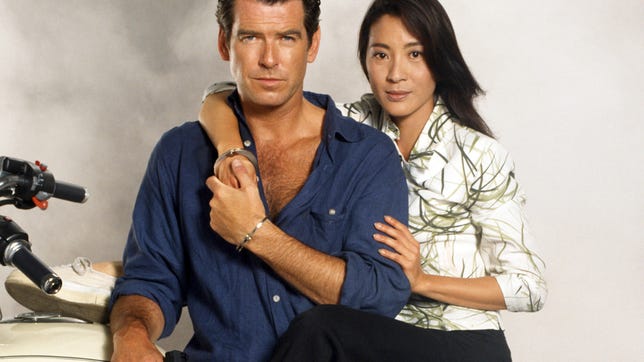
20th Century Fox Home Entertainment
The first of the four Pierce Brosnan Bond movies in this list gets credit for giving Michelle Yeoh an early Hollywood showcase — but for little else. According to Salon’s Charles Taylor, this 1997 movie “scores zero in suspense, wit or class.”
When averaged, Brosnan’s four James Bond movies post a 57.5 Metascore, the second-lowest among 007 actors who have starred in at least four movies.
At the box office, Tomorrow Never Dies, featuring Jonathan Pryce as villain Elliot Carver, grossed $339.5 million worldwide. That’s on par with, but on the low end of, the other films of the Brosnan era.
Metascore: 52

MGM
Critics are kinder, if still cool, to Roger Moore’s fifth 007 adventure. In the Chicago Sun-Times, critic Roger Ebert wrote that the 1981 film “is a competent James Bond thriller. … But it’s no more than that.”
Aside from its reviews, For Your Eyes Only is a success of the Roger Moore era: It earned an Oscar nomination for its Sheena Easton-crooned title song, and it grossed $195.3 million worldwide — the second-best box office showing for a Moore installment.
Metascore: 54
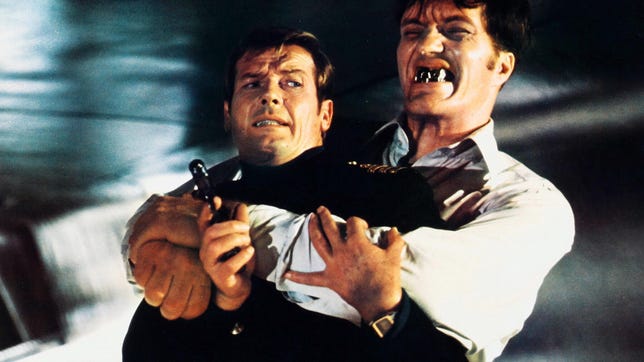
LMPC/Getty Images
21 (tie). The Spy Who Loved Me
Nominated for a franchise-best three Oscars, this 1977 Roger Moore adventure nonetheless rated mixed reviews from critics. “After the opening sequence,” Newsweek’s Maureen Orth wrote, “much of the action in The Spy Who Loved Me … is somewhat downhill.”
The Spy Who Loved Me, featuring the first of two franchise appearances by Richard Kiel as the villainous Jaws, grossed $185.4 million worldwide, making it one of the biggest box office hits of its release year.
Metascore: 55

MGM
21 (tie). Live and Let Die
Roger Moore’s first James Bond movie is, well, another middling effort — at least per the critics. In retrospect, this 1973 film may have suffered by comparison with the just-concluded Sean Connery era.
“Even the art direction — long the Bond films’ real secret weapon — seems to have fallen to a shrunken budget,” the Chicago Reader’s Dave Kehr wrote. “Not much fun.”
At the box office, Live and Let Die, co-starring Geoffrey Holder as the voodoo-practicing henchman Baron Samedi and Yaphet Kotto as head bad guy Katanga/Mr. Big, and featuring the hit title song by Paul McCartney’s Wings, was a big step up from the Sean Connery film that preceded it, Diamonds Are Forever. Live and Let Die grossed $161.8 million worldwide.
Metascore: 55
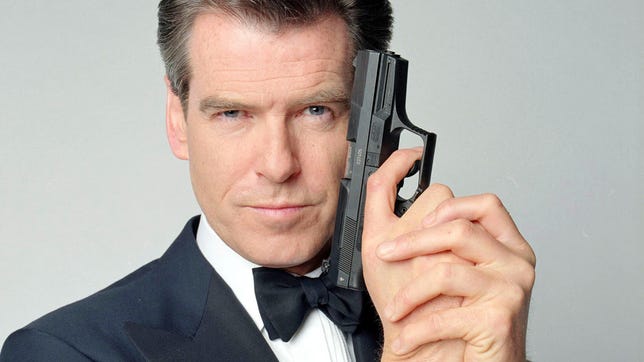
MGM
The final Pierce Brosnan James Bond film may have introduced the invisible car, but critics think of this 2002 film as a retread, not an innovator. “Surely it will not be giving things away to tell you there’s absolutely nothing new about the latest episode,” Desson Thomson wrote in The Washington Post.
Co-starring then-reigning Oscar winner Halle Berry as Bond girl Jinx Johnson, with Monty Python’s John Cleese as Q, and featuring the hit title track by Madonna, Die Another Day grossed more money than any other Pierce Brosnan 007 film: $431.9 million worldwide.
Metascore: 56
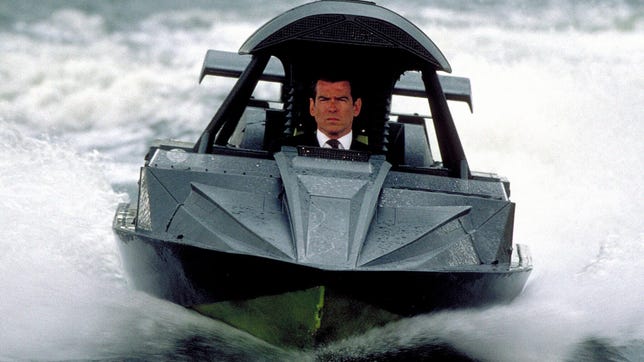
Keith Hamshere/Sygma/Getty Images
19. The World Is Not Enough
This 1998 film is the third Pierce Brosnan James Bond film. “This keeps one reasonably amused, titillated, and brain-dead for a little over two hours,” Jonathan Rosenbaum wrote in the Chicago Reader.
The World Is Not Enough grossed a solid $361.7 million at the worldwide box office. It co-stars Robert Carlyle as the villain Renard, who feels no pain; Sophie Marceau as the strikingly conflicted Elektra King; and Denise Richards as a nuclear physicist.
Metascore: 57

MGM
17 (tie). Licence to Kill
The second — and final — James Bond movie of the Timothy Dalton era gets good marks as an action movie, but not necessarily as a 007 movie. “James Bond might as well be any of a dozen movie cops,” the St. Louis Post-Dispatch’s Joe Pollack wrote of this 1989 entry.
Licence to Kill, featuring Robert Davi as the drug lord villain Sanchez, Carey Lowell as Bond girl Pam Bouvier and a young Benicio del Toro as a henchman, grossed $156.2 million worldwide — a big drop at the box office compared with Dalton’s debut 007 film.
Metascore: 58

MGM
17 (tie). Quantum of Solace
This 2008 film is the worst-reviewed of the 007 Daniel Craig era. “Quantum of Solace may be explosive with images of fiery infernos,” Film Threat’s Jay Slater wrote, “but it’s convoluted and confusing.”
On the whole, the Craig-led Bond films boast a Metascore average of 69.4, making his movies the second-best reviewed 007 movies of all time.
On one hand, Quantum of Solace, co-starring Mathieu Amalric as Bond villain Dominic Greene, is one of the biggest-grossing James Bond movies of all time, with $591.7 million in worldwide ticket sales. On the other hand, the film is the lowest-grossing James Bond film starring Daniel Craig.
Metascore: 58
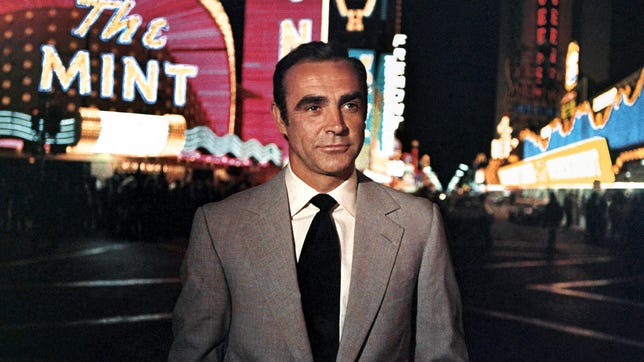
MGM
The lowest-ranked Sean Connery film in this rundown is the Scotsman’s sixth Bond project — and the last one that the iconic star made before taking a 12-year 007 hiatus. According to critics, Diamonds Are Forever was evidence of a franchise in need of new blood.
The New Yorker’s Pauline Kael called the film an “unimaginative Bond picture that is often noisy when it means to be exciting.”
Diamonds Are Forever co-stars Charles Gray as arch-villain Blofeld and Jill St. John as Bond girl Tiffany Case, and features Putter Smith and Bruce Glover as the archly menacing Mr. Kidd and Mr. Wint, respectively. Among the Sean Connery 007 installments, the movie grossed a middling $116 million worldwide.
Metascore: 59

MGM
This 2015 Daniel Craig adventure is “filled with big sets, big stunts, and what ought to be big moments,” Matt Zoller Seitz noted for RogerEbert.com, “but few of them land.”
Spectre co-stars Christoph Waltz in a new take on the old reliable Bond villain Blofeld, with Ralph Fiennes taking over as M, and like Skyfall, delves deeper into Bond’s origin story. It grossed a whopping $879.6 million worldwide, the second-biggest take for the franchise.
Metascore: 60
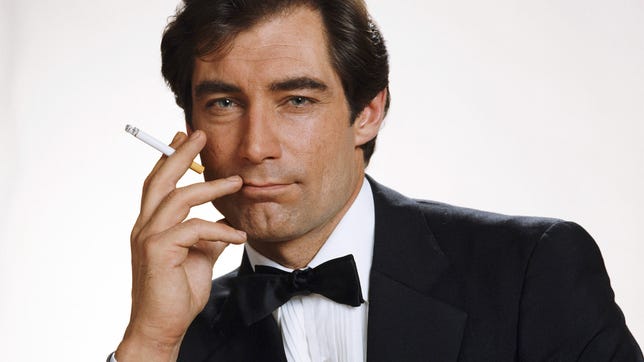
Keith Hamshere/Getty Images
14 (tie). The Living Daylights
This 1987 Timothy Dalton entry, the first of his two turns as James Bond, wins points from critics for not being a Roger Moore entry. “After the fizzle of the later Roger Moore Bonds,” Empire’s Kim Newman wrote, “The Living Daylights brings in a new 007 … who manages the Connery trick of seeming suave and tough at the same time.”
The Living Daylights outgrossed its predecessor, Roger Moore’s A View to a Kill, by nearly $40 million, for a worldwide box office total of $191.2 million.
Metascore: 60

Sunset Boulevard/Getty Images
12 (tie). On Her Majesty’s Secret Service
This 1969 film, which marks George Lazenby’s lone outing as James Bond, is a pretty good 007 entry, per critics. While the New Yorker’s Pauline Kael found its star “quite a dull fellow,” she called the movie “exciting.”
On Her Majesty’s Secret Service broke new ground: It featured a James Bond wedding, with Diana Rigg as 007’s feisty but ill-fated bride, Tracy di Vincenzo. At the box office, though, the film fell flat with an $82 million worldwide gross.
Metascore: 61

Express Newspapers/Getty Images
12 (tie). You Only Live Twice
This 1967 entry marks Sean Connery’s fifth outing as James Bond. Chicago Sun-Times critic Roger Ebert saw signs of wear: “Connery labors mightily,” Ebert wrote.
For a Sean Connery James Bond movie, You Only Live Twice grossed a so-so $111.6 million worldwide. The film is nonetheless influential: Its cat-petting iteration of Blofeld (played by Donald Pleasence), complete with villain’s hideaway in a volcano, inspired the Austin Powers franchise’s Dr. Evil.
Metascore: 61

MGM
According to critics, this 1983 film is Roger Moore’s second-best James Bond movie. “It soars, all right, but it does it on automatic pilot,” wrote Jay Scott for Toronto’s Globe and Mail.
Octopussy, co-starring Maud Adams in her second franchise outing (after The Man with the Golden Gun), as the titular character, grossed a solid $187.5 million worldwide.
Metascore: 63

LMPC/Getty Images
According to critics, this 1965 film is a lesser Sean Connery 007 entry, but a worthy entry overall. Wrote Empire’s Kim Newman, the movie “effortlessly plies the glory Bond years, concluding with a stunning underwater battle.”
Thunderball is the top-grossing Sean Connery 007 movie of the 1960s and 1970s: It took in $141.2 million in worldwide ticket sales. It also provided the template for Connery’s final James Bond outing nearly two decades later, Never Say Never Again.
Metascore: 64
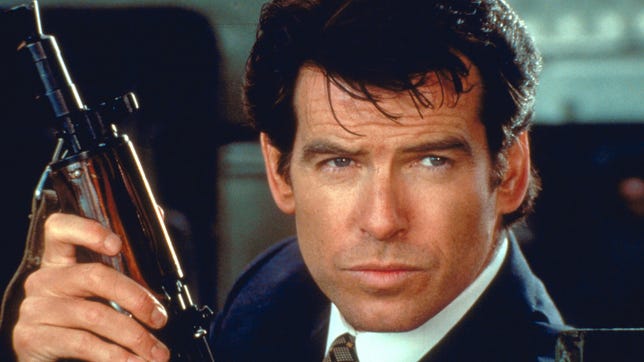
MGM
The first Pierce Brosnan Bond movie is the best Pierce Brosnan Bond movie, per critics. “New Bond man Brosnan can’t be faulted for much,” Desson Thomson wrote in The Washington Post. “In this new venture, he’s appropriately handsome, British-accented and suave.”
GoldenEye featured Sean Bean as a double-0 agent turned bad guy, Famke Janssen as Bond girl Xenia Onatopp and Judi Dench in her first turn as Bond boss M. It grossed a then-huge $356.4 million worldwide. Pent-up demand may have helped: The 1995 film was the first James Bond movie since Timothy Dalton’s License to Kill, released six years prior.
Metascore: 65
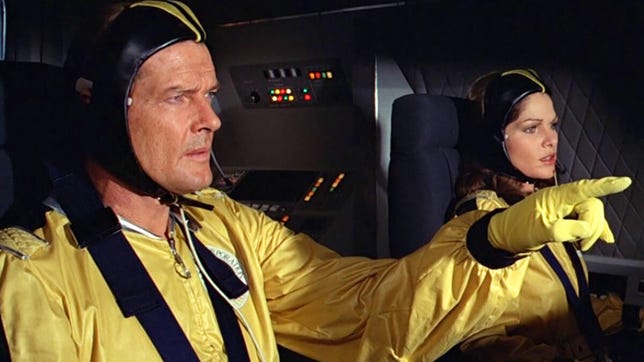
MGM
Released in 1979, two years after Star Wars changed just about everything in Hollywood, the fourth Roger Moore James Bond film sees 007 sent to outer space. Critics non-ironically cheered. “Moonraker is a satisfying blend of familiar ingredients,” wrote The Washington Post’s Gary Arnold.
Moonraker, co-starring Lois Chiles as astronaut Holly Goodhead (yes, really), is the ninth-biggest-grossing James Bond movie of all time, with $210.3 million in worldwide ticket sales.
Overall, Moonraker is the best-reviewed Bond movie of the Moore era.
Metascore: 66
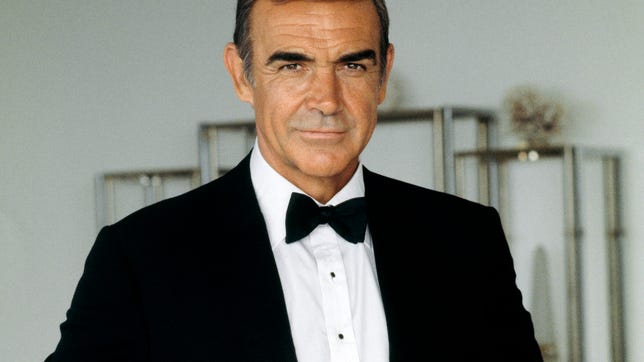
Sheila Penn/Getty Images
6 (tie). Never Say Never Again
The top-grossing Sean Connery Bond movie, this 1983 film is also one of the better-reviewed Bond movies.
Never Say Never Again marked Connery’s final 007 appearance and, from a critical standpoint, seems to have benefited from having been released during the reviled tail end of the Roger Moore era.
“It is good to see Connery’s grave stylishness in this role again,” Time’s Richard Schickel wrote. “It makes Bond’s cynicism and opportunism seem the product of genuine worldliness (and world weariness) as opposed to Roger Moore’s mere twirpishness.”
Despite the presence of Connery, who first embodied Bond on the big screen, this movie wasn’t from Eon Productions, making it the second of the two non-canonical films in our list.
Metascore: 68
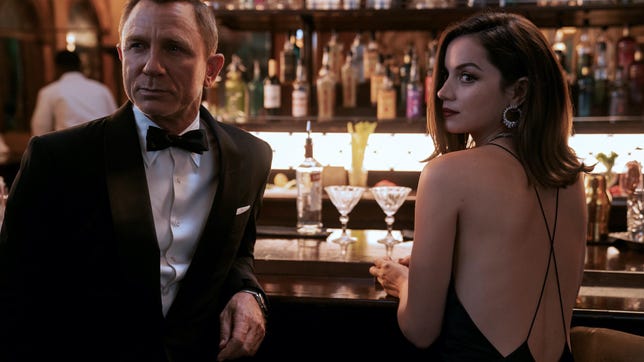
Universal
The final film to star Daniel Craig as 007 has drawn largely positive reviews, following an extended wait for its release brought about by production delays and the coronavirus pandemic. With a running time of 2 hours, 43 minutes, No Time to Die is the longest Bond movie of them all.
“No Time to Die packs a quintessentially Bond punch while also taking huge risks with the aging character and decades-old formula,” Richard Trenholm said in CNET’s No Time to Die review. “Every Bond film markets itself as a fresh twist, but No Time to Die is genuinely bonkers at how far it goes.”
Or put more simply: “James Bond finally gets a life.”
Metascore: 68

Andrew Matthews/PA Images via Getty Images
The first James Bond feature film, released in 1962 (though it didn’t arrive in the United States until 1963), is one of the best James Bond movies, per critics. “Sean Connery excellently puts over a cool, fearless, on-the-ball, fictional Secret Service guy,” Variety praised.
Dr. No, featuring Ursula Andress as original Bond girl Honey Ryder (yes, really), was one of 1963’s Top 10 box office hits. It grossed $59.6 million worldwide.
Metascore: 78

MGM
The first Daniel Craig James Bond movie, Casino Royale blew away critics with its new take on the spy saga. “[Craig’s] Bond is at least the equal of the best ones before him, and beats all of them in sheer intensity,” The Wall Street Journal’s Joe Morgenstern raved.
The opening minutes of the film reveal how Bond earned his double-0 rating, and for fans of the Ian Fleming novels, it manages to both stay true to the 1953 book and adapt that story for audiences a half-century later.
The 2006 film grossed a then-franchise-best $594.4 million worldwide.
Metascore: 80

MGM
The top-grossing James Bond movie to date, with a worldwide take of more than $1.1 billion, this 2012 film is, according to critics, the best Daniel Craig 007 movie — and that’s not all.
“Skyfall is one of the best Bonds in the 50-year history of moviedom’s most successful franchise,” James Adams wrote in Toronto’s Globe and Mail.
The film won the series’ first two Oscars since 1964’s Goldfinger; it claimed statuettes for sound editing and for Adele’s title song.
Metascore: 81
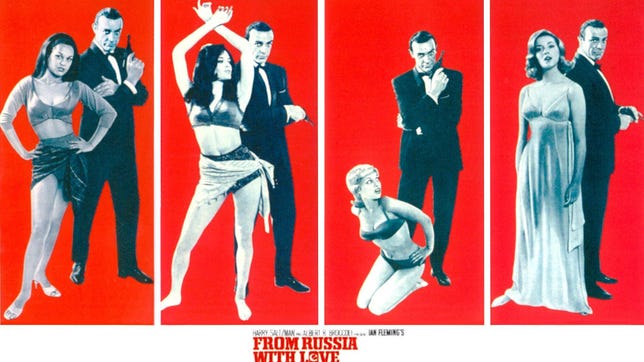
LMPC via Getty Images
The second James Bond movie is, per the critical consensus, the second-best James Bond movie ever. The New Yorker’s fabled Pauline Kael praised the 1963 release: “Exciting, handsomely staged, and campy.”
From Russia With Love, featuring Lotte Lenya as Bond baddie Rosa Klebb and Robert Shaw as the Spectre assassin gunning for Bond, grossed $78.9 million worldwide, a take that represented significant growth over Dr. No, and firmly established 007 as a franchise to watch.
Metascore: 83
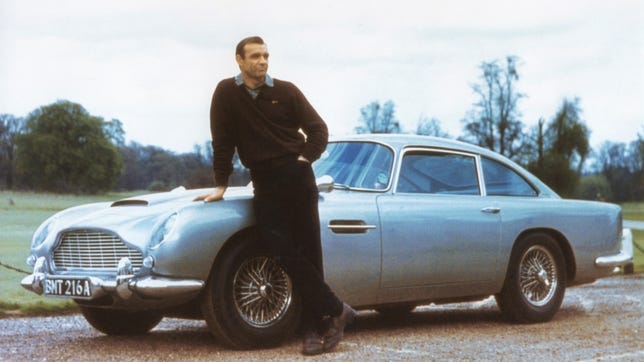
Sunset Boulevard/Corbis via Getty Images
Here it is: This 1964 Sean Connery entry is, per the critical consensus, the best James Bond movie. It had all the elements we’ve come to expect: the megalomaniac villain with an outrageous and murderous scheme, the henchman with a quirky method for killing (Oddjob and his hat), big set pieces with extravagant action, Bond in a dinner jacket.
“Larger than life, faintly ridiculous, completely cool, Goldfinger is the quintessential James Bond movie,” Empire’s Ian Freer wrote.
The film grossed a then-franchise-best $124.9 million worldwide and won the franchise’s first Oscar (for sound effects).
When Connery’s seven 007 movies are taken together, the average Metascore comes in at 71.4, making his run the undisputed leader among Bond movies.
Metascore: 87
James Bond movies in chronological order
In the official Bond canon — the films made by Eon Productions — there are 25 films, including No Time to Die. Because of licensing issues, there were two other, non-canonical movies: the 1967 version of Casino Royale, and Sean Connery’s final outing, 1983’s Never Say Never Again.
Sean Connery
David Niven, among others
George Lazenby
Sean Connery, first comeback
Roger Moore
Sean Connery, second comeback
Roger Moore, still on his run
Timothy Dalton
Pierce Brosnan
Daniel Craig
[ad_2]
